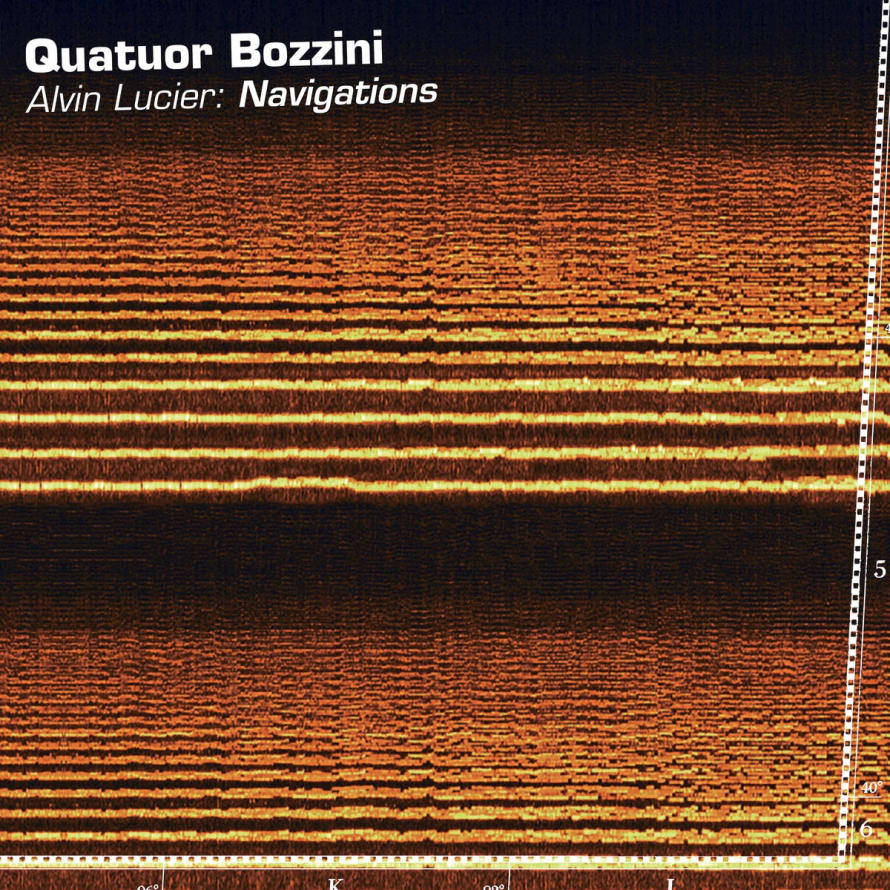Montréal-based string quartet Quatuor Bozzini have been a mainstay in the Canadian classical music scene for over two decades. Favouring the avant-garde end of the musical spectrum, the quartet has been unafraid of suffusing playful and inventive interpretations throughout a repertoire dedicated to experimentation. Off the heels of 2020's buoyant Ana Sokolović: Short Stories, Quatuor Bozzini pare things down with Alvin Lucier: Navigations, an ode to the quartet's relationship with the titular American composer and his material.
This collection of five tracks recorded in concert is timely, as Alvin Lucier's reputation has been crystallizing as of late. A contemporary of minimalist pioneers and a towering figure of experimental and contemporary classical music in his own right, Lucier and his recent work have been celebrated anew by labels like Oren Ambarchi's Black Truffle Records.
Quatuor Bozzini's collection is a welcome addition to the attention on Lucier, especially given this release's focus on some of the composer's lesser-known works for string quartet. While Lucier's most applauded pieces tend towards less conventional instruments, the quartet succeed in conveying his interest in relationships between the acoustic phenomena of a place and the instruments and amplification systems around. "Disappearances" announces what we should expect from Lucier when composing for strings; a deep respect for the power of a sustained string. The piece utilizes unison violin and cello tones to gradually bring out the characteristics of the room. Two versions of "Group Tapper" are highlights, as they display the sonic variety that can be had when all four players are tapping the bodies of their respective instruments in a different place and at different tempos.
Listeners with only a passing familiarity with Lucier's work might detect layers of conceptual baggage in the quartet's performance, but it is important to note that the best results are achieved if one assumes that Lucier is trying to lay as bare as possible the sonic characteristics of the materials that performers have at their disposal. Whether a recording was made in the composer's bedroom or in a concert hall, featuring the bowing of a violin or a brain's alpha waves rendered audible, the substance of Lucier's work often is in the particulars of an interaction. Quatuor Bozzini's release is an occasion to celebrate what is ultimately the fearless act of letting the sounds of one's world ring naked for others to hear.
(Collection QB)This collection of five tracks recorded in concert is timely, as Alvin Lucier's reputation has been crystallizing as of late. A contemporary of minimalist pioneers and a towering figure of experimental and contemporary classical music in his own right, Lucier and his recent work have been celebrated anew by labels like Oren Ambarchi's Black Truffle Records.
Quatuor Bozzini's collection is a welcome addition to the attention on Lucier, especially given this release's focus on some of the composer's lesser-known works for string quartet. While Lucier's most applauded pieces tend towards less conventional instruments, the quartet succeed in conveying his interest in relationships between the acoustic phenomena of a place and the instruments and amplification systems around. "Disappearances" announces what we should expect from Lucier when composing for strings; a deep respect for the power of a sustained string. The piece utilizes unison violin and cello tones to gradually bring out the characteristics of the room. Two versions of "Group Tapper" are highlights, as they display the sonic variety that can be had when all four players are tapping the bodies of their respective instruments in a different place and at different tempos.
Listeners with only a passing familiarity with Lucier's work might detect layers of conceptual baggage in the quartet's performance, but it is important to note that the best results are achieved if one assumes that Lucier is trying to lay as bare as possible the sonic characteristics of the materials that performers have at their disposal. Whether a recording was made in the composer's bedroom or in a concert hall, featuring the bowing of a violin or a brain's alpha waves rendered audible, the substance of Lucier's work often is in the particulars of an interaction. Quatuor Bozzini's release is an occasion to celebrate what is ultimately the fearless act of letting the sounds of one's world ring naked for others to hear.




